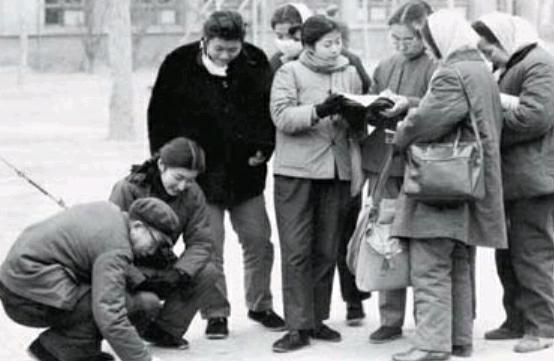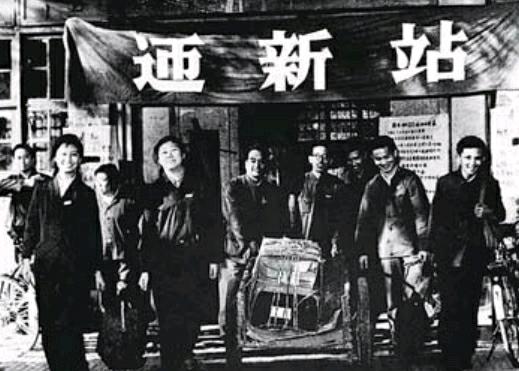Gaokao:40-Year-Old Turning Point
2017-07-19byZhangXue
by+Zhang+Xue



In December 1977, Chinas passport to higher education reemerged after an absence of 11 years, at which time 5.7 million people ranging from teenagers to young adults took the exam across the nation. Coming from almost all corners of the country—schools, fields, army barracks and factories, they embraced the first chance of their lives to receive higher education through fair competition. Indeed, the life-changing exam turned the fate of many candidates that year, as it has in the decades since.
Turning Point
Chen Yongjun will never forget the date of October 21, 1977. Before leaving work to go home that day, then 22-year-old Chen got the news from China National Radio (CNR) that the gaokao—the national entrance examination to colleges and universities—would return. “It was a busy, noisy time in the factory when we heard the news,” he recalls. “I couldnt hear the whole piece, but I caught the phrase ‘resuming the gaokao.”
The next day, Chen rushed to the reading room as soon as he arrived at the factory to look for the previous days Peoples Daily, where he found the full text of the gaokao resumption notice.
He was one of many high-school graduates who devoted considerable time to various campaigns outside academic studies during the “cultural revolution” period (1966-1976). “I didnt expect to pass the exam because I hadnt learned much in school,”admits Chen. “But the past didnt really matter because the exam could still change my fate.” He decided to register, alongside a few other fellow workers.
With a month until the exam, Chen hunted for study materials and worked hard, late at night after work and during any daylight time he could find.
“During the decade-long ‘cultural revolution, none of us got a solid educational foundation,” says Chen. “I am extremely grateful to my primary school teachers, who had helped me up in the first step towards the exam." As well as studying hard, he attributes his success to good habits like reading books and newspapers. “When I was a child, I found Political Economy of the Soviet Union on my fathers bookshelf, and I liked it so much that I took it with me to work.” The book might have played a role in Chens choice to study economics after graduation from college.
That year, 270,000 young men received admission letters from colleges and universities after fierce, fair competition.
In 1978, Chen bid farewell to his co-workers and headed to Anhui Institute of Finance and Economics in Bengbu, Anhui Province. In an unprecedented move, candidates passing the exam in 1977 and 1978 started the semester simul- taneously. He was part of the “non-traditional” group composed of mostly older students who had delayed college due to the chaotic“cultural revolution.”
“There were two generations in my class,” grins Chen. “The youngest was 16 and the oldest 32.” Even with five years of experience in a railway power plant under his belt, he wasnt even close to being the oldest in the class.
The campus buzzed after so many years of silence. Joy filled the air as people read books and recited poetry. Early each morning, students could be seen on playgrounds and in front of dining halls reciting English words and expressions or reading textbooks aloud.
“We were lucky to have a number of professors who had studied at world-famous universities such as Harvard, Cambridge and Oxford. Their talents had been wasted during the ‘cultural revolution and they were excited to be back,” recalls Chen. “Our class was so lively.”
After receiving an undergraduate degree, Chen Yongjun continued studying for a Ph.D. and eventually became a professor of economics. Today, he is an internationally-renowned economics scholar and teaches at the Business School of Renmin University of China. His days are frequently packed: A few days ago, he returned home in Beijing at 5:00 a.m. from a Belt and Road seminar for local entrepreneurs in Shenzhen, Guangdong Province, but before taking a rest, he appeared at an academic salon at the School of Management of Renmin University of China at noon. After that, he rushed to a lecture for EMBA students at the university in the evening.
A month ago, Professor Chen returned to his old power plant to attend a reunion of former employees, most of whom have since retired. After seeing familiar faces again after such a long absence, everyone appeared emotional and waxed nostalgic about the good old days.“The gaokao helped me make a beautiful turn at the crossroad of my life,”Chen admits. “For me, every step I took at various times was crucial. My five-year experience of working in the power plant gave me the chance to learn about the grass-roots class in China. It ensured that I stayed grounded during my academic research.”




A Life Marked by the Era
“Such stories were like drops of water in the sea during that era,” Chen Yongjun sighs, contemplating the relationship between his personal life and career. “Individual destinies are often determined by the backdrop of the times. Drops of water dont shine except at the top of the sea, riding the waves.”
In 1976, China was plagued by a severe lack of professional personnel after the “cultural revolution.” In May 1977, Deng Xiaoping, who hadnt yet officially resumed his post, noted that “the key to modernization is advancing science and technology, which requires education. Empty talk wont make it happen. We must seize knowledge; we must have talented personnel.”
In July of the same year, Deng Xiaoping resumed his chair as Chinas head of education, science and technology. On August 4, he proposed a symposium and invited famous scientists and education experts from across China to formulate an action plan. Overwhelmingly, attendees complained inordinately about the system of admitting students to colleges and universities.
At that time, Chinese institutes of higher learning only admitted students who were recommended by the masses and approved by authorities. During the “cultural revolution,” education in primary and middle schools became fractured, with quality varying widely. The recommendation system enabled widespread abuse, leaving countless outstanding minds without access to higher education and a polluted pool of college students.
At a seminar attended by heavyweights of education and scientists from around the country, Professor Zha Quanxing from Wuhan University cut straight to the reasons causing the chaos in higher education, and requested the resumption of the national admission system and fair examinations that would recruit the best talent.
After several rounds of discussions, on October 12, 1977, the State Council of China ratified the Ministry of Educations Opinions on the Recruitment of Colleges and Universities in 1977, which stipulated that workers, farmers and educated youths who worked in the countryside and mountainous areas, veterans and that years high-school graduates were all eligible to take the entrance examination if they met basic educational requirements. Qualified candidates could voluntarily register for the unified exam.
That U-turn was mirrored in millions of lives. Many of those who passed the resumed college entrance exams in 1977 and 1978 are now leaders in sectors such as politics, commerce, academics, and culture. Standouts including Li Keqiang, Chinas premier of the State Council, who was admitted to the Department of Law at Peking University in 1978, Wang Yi, Chinas foreign minister and an alumnus of Beijing International Studies University, and prolific film director Zhang Yimou, who was admitted to the Department of Photography at Beijing Film Academy in 1978.
Those who passed the exam in 1977 and 1978 hardly had a choice in becoming trendsetters. After enduring turbulent lives, they returned to colleges with inflexible will and big long-term goals. Their work and life experiences gave them a far-reaching vision and the grit to endure hardships. Those people came of age as industries throughout the country were struck by a talent crisis, so the generation was saddled with a historic mission to drive Chinas rapid development after the implementation of reform and opening-up policies.